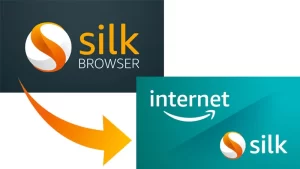Amazon silk browser advantages, disadvantages, review and download
Amazon has introduced new software: Amazon Silk alongside its new tablet, the Kindle Fire, Amazon Silk is a new web browser for tablets, and it will come pre-loaded on the Kindle Fire. Amazon Silk is a thread of silk, It is an invisible yet incredibly strong connection between two different things, and thus calls the browser Amazon Silk as it is the connection between Kindle Fire and Amazon’s EC2 servers.
Amazon Silk
It is a web browser developed by Amazon, It was launched in November 2011 for Kindle Fire and Fire Phone, and a Fire TV version was launched in November 2017, Amazon Silk uses the split architecture where some of the processing is performed on Amazon’s servers to improve the webpage loading performance, It is based on the open-source Chromium project that uses the Blink engine.
Silk decides which browser subsystems (networking, HTML or page rendering) to run on the device and which to run remotely on its own Amazon EC2 servers. Silk uses Google’s SPDY protocol to speed up the loading of web pages, Silk offers SPDY performance improvements for non-SPDY optimized websites when the pages are sent through Amazon’s servers.
How will Silk help Amazon’s commerce business?
Faster browsing means more buying, There is considerable evidence that faster web browsing leads to more engagement on sites, and that removing friction in the online purchase process leads to more sales, This is why Amazon’s “1-Click” buying feature has been such a boon, Simply by making browsing faster, Amazon should drive more sales.
Amazon will have access to lots of consumer data, the browsing by Amazon Silk users goes through Amazon’s cloud servers, so, Amazon should have amazing data on people’s browsing and buying habits, (All of that data would have to be anonymous and aggregate, obviously, or Amazon will be clobbered by privacy zealots, But it will still be useful.) This could give Amazon great market intelligence and allow it to target offers better.
Amazon silk browser advantages
Amazon silk should make web browsing on Kindle much faster, by using Amazon’s cloud infrastructure to preload the sites people visit most often. Amazon silk should help grow Amazon’s commerce business. Amazon silk will give Amazon exceptional insight into what consumers are interested in, how they use the mobile Internet, and what they want to buy.
Amazon silk makes the Android operating system, the platform upon which the Kindle Fire runs, much less relevant, It is Amazon’s browser that will control the consumer’s interface and data—and search window—not the operating system, Google’s software has become a device-driver.
Much of the work of rendering web pages is done in the cloud, So, Silk can perform faster than your typical mobile browser, With some web pages requiring access to many domains and downloading of hundreds of files, handing that task off to the much more powerful computers in Amazon’s Elastic Compute Cloud (EC2) frees up computing the resources and bandwidth that would otherwise be consumed locally on your tablet.
Rendering pages in the cloud allows the size of the browser cache on the Fire to be reduced, Which saves storage space, always a good idea on mobile devices which have storage constraints, Silk can keep its connection to Amazon’s cloud always open, That reduces latency when you launch the browser and begin surfing the web, latency is the time lag between issuing the command and the function being completed.
Tying Silk to the cloud allows Amazon to use its predictive technologies to guess what web pages you’ll be asking for before you ask for them, That can speed up the performance, too. Another benefit of Silk is that content can be tailored to Fire before it reaches the device, Large images on the web page can be compressed to meet the real estate requirements of the tablet’s screen.
JavaScript code found on web pages can be compiled into ARM machine code by its servers, which would boost the web page’s performance on its tablet, The end result is the delivery of the web pages that consume less bandwidth and perform better when they’re displayed in Silk.
Amazon silk browser disadvantages
Amazon’s cloud can act as a middleman between the user and the Internet, It raises obvious questions about privacy, When you worry about Facebook tracking your activity on any web page containing the “like” button, your anxiety levels should skyrocket at the prospect of Amazon tracking your every move on the Web, Amazon says the information it gathers will be kept anonymous.
Security is an issue in Silk, Because you’re interacting with Amazon’s cloud, you’re never directly interacting with secure websites, So when you log into your bank, that information is given to Amazon, which conveys it to your financial institution.
Amazon’s credit allows you to turn off Silk’s cloud features and use it like a typical browser, That would address the privacy and security problems that could arise from using the software, but you’ll lose all the benefits of processing browser activity in the cloud.
Another issue with not receiving content directly from the website is that you don’t know how long it took Amazon to configure the content it sends to you, or, in the case of cached pages, You may want the 3MB photo served up by the site and not the 30KB version EC2 sends to you.
The proliferation of the Silk approach to browsing could pose problems for all web surfers in the future, If major browser makers with cloud clout decide to adopt the Silk model, So, Amazon, Google, Apple, and Microsoft will know your every move on the Web.
You can download Science online application on google play from this link: Science online Apps on Google Play
Chromium browser review, uses, features, advantages, and disadvantages
What are the advantages and disadvantages of Google Chrome?
What is the difference between Chromium and Google Chrome?
Mozilla Firefox advantages, disadvantages, review & features
SeaMonkey browser features, uses, advantages and disadvantages
Avant Browser review, features, uses, advantages, and disadvantages




